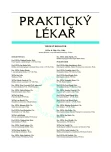-
Medical journals
- Career
All of the facts belong only to the problem, not to its solution: relationship between science, ethics and religion
Authors: M. Vácha
Authors‘ workplace: Přednosta Ústavu etiky: Mgr. et Mgr. Marek Vácha, Ph. D. ; Ústav etiky, 3. lékařská fakulta Univerzity Karlovy, Praha
Published in: Prakt. Lék. 2010; 90(4): 251-253
Category: Topic
Overview
The science uses so called metodological naturalism and works with measurable phenomenones. The science is therefore helpless in an effort to prove or disprove the existence of nonmeasurable phenomenones, such as the human soul or God. The possible existence of such nonmeasurable phenomenones thus has to rest unresolved. The situation is furthermore complicated by the fact, that the scientists, philosophers and theologians have different definitions of the notions like „God“ and „to exist“. The religion itself, nevertheless, is a measurable phenomenon, and in the frame of darwinian paradigm, its existence could be explained either as a by-product of the evolution, or as an adaptation. The science tries not to verify given hypothesis, but on the contrary to falzify them. If scientists are not able to create any experiment, which would falzify given hypothesis, it is no more science, but pseudoscience. Given the fact, that we are able to explain both the existence of the religion and its potential nonexistence, we find ourselves in the risk of pseudoscience.
Key words:
philosophy of science, ethics, verification, falzification, pseudoscience, evolution.
Sources
1. Anzenbacher, A. Úvod do etiky. Praha, Kostelní Vydří: Karmelitánské nakladatelství, Academia, 2001. 292 str. ISBN 80-7192-698-1.
2. Beauregard, M., Paquette, V. Neural correlates of mystical experience in Carmelite nuns. Neurosci. Lett. 2006, 405, p.186-190.
3. Beauregard, M., Paquette, V. EEG activity in Carmelite nuns during mystical experience Neurosci. Lett. 2008, 444, p.1-4.
4. Cartwright, J.H. Evolution and Human Behaviour. 1st ed. Mendham, Suffolk: MIT Press, 2000. 400 p. ISBN-10 : 0262531704.
5. Collins, F. The Language of God. New York: Free Press 2007, 294 p. ISBN-10 : 1416542744.
6. Dennett, D.C. Darwin’s Dangerous Idea: Evolution and the Meanings of Life. London: Simon & Schuster 1996, 586 p. ISBN-10 : 068482471X
7. Koukolík, F., Náboženství - evoluce a neurobiologie. Prakt. lék. 2009, 89 11, p. 621-626.
8. Lash, N. Holiness, Speech and Silence: Reflections on the Question of God. Burlington VT: Ashgate Publishing 2004, 98 p. ISBN-10 : 0754650391.
9. Okasha, S. Philosophy of Science: A Very Short Introduction. 1st ed. Oxford: Oxford University Press 2002, 160 p. ISBN-10 : 0192802836.
10. Popper, K. The Logic of Scientific Discovery. London, NewYork: Routledge Classic 2002, 544 p. ISBN-10 : 0415278449.
11. Wilson, E.O. Sociobiology: The New Synthesis. Cambridge MA: Belknap Press of Harvard University Press 2000, 720 p. ISBN-10 : 0674002350
Labels
General practitioner for children and adolescents General practitioner for adults
Article was published inGeneral Practitioner

2010 Issue 4-
All articles in this issue
-
Evolution and evolutionary theory for physicians.
IV. Life on Earth - Urologic care of patients after spinal cord injury
- What should a general practitioner know about drinking water? Part I.: Water in health promotion.
- Myocarditis
- Occurrence of polycystic ovary syndrome and hyperadrogenemia in women with type 1 diabetes mellitus
- The prevalence of asymptomatic individuals with high risk of cardiovascular disease in the Czech population and their adherence to primary prevention targets
- Heart failure with preserved systolic function of the left ventricle
- Development of spiritual care in the University Hospital Motol
- Prevention of lung cancer due to radon
- Subcutaneous traumatic rupture of the tibialis anterior tendon
- All of the facts belong only to the problem, not to its solution: relationship between science, ethics and religion
-
Evolution and evolutionary theory for physicians.
- General Practitioner
- Journal archive
- Current issue
- Online only
- About the journal
Most read in this issue- Myocarditis
- Subcutaneous traumatic rupture of the tibialis anterior tendon
- Occurrence of polycystic ovary syndrome and hyperadrogenemia in women with type 1 diabetes mellitus
- Heart failure with preserved systolic function of the left ventricle
Login#ADS_BOTTOM_SCRIPTS#Forgotten passwordEnter the email address that you registered with. We will send you instructions on how to set a new password.
- Career

